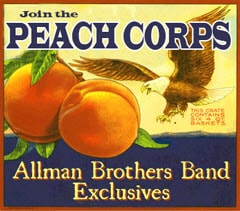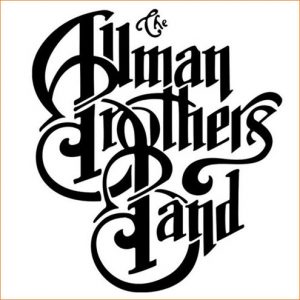By Malcolm X Abram
Macon Telegraph Staff Writer
10/21/2001

Duane Allman was a human magnet.
His commanding personality and belief in what he was doing inspired the loyalty of the 10 people – musicians and roadies – who came together to form the original Allman Brothers Band in 1969.
His ability to take an empty Coricidin bottle, place it on his ring finger and caress beautiful music out of his favorite Les Paul guitar attracted admiration from musicians, fans and critics.
It also laid the groundwork for a genre of music that became Southern rock, the musical bedrock of the Capricorn Records empire that cemented Macon’s place in popular music history.
And Allman, along with his bandmates’ propensity for hard partying, also drew the attention of the law and helped build an image of a touring band of out-of-control hippies who could rip apart any stage they set foot on.
Allman’s slide-guitar playing so impressed the legendary Eric Clapton, one of his heroes, that Clapton asked Allman to contribute to what some critics consider the highlight of Clapton’s discography: the classic “Layla & Other Assorted Love Songs.” It was Duane who created the title song’s signature riff.
Duane Allman achieved all of these things in less than three years.
On Oct. 29, 1971, the 24-year-old hopped on his purple Harley-Davidson Sportster and left the “Big House,” the group’s communal hangout on Vineville Avenue near Clisby Elementary School, and headed back to his west Macon apartment. At the intersection of Hillcrest Avenue and Bartlett Street – the base of a steep hill – Allman was hurtling directly toward the back of a truck that had stopped in the road. He swerved, but he hit something hanging out of the truck, sending both him and his Harley flying. The impact of the crash caused massive internal injuries, and he died a few hours later at the hospital.
Next Monday marks the 30th anniversary of the accident that took the life of the Allman Brothers’ guiding force and what many music purists consider to be the greatest rock ‘n’ roll slide guitarist ever. The band that he started continues, as does his influence on guitar players around the world.
Learning to play
While listening to his play on the Allman Brothers’ early records may give the impression that Allman came out of the womb with a slide on his finger, Paul Hornsby recalls that Allman first became fascinated with the sonic possibilities of the slide after listening to “Beck’s Bolero” from Jeff Beck’s “Truth” album in 1968.
“Somebody learning to play the slide guitar is the worst thing in the world,” said Hornsby, a former Capricorn producer and a keyboardist in Duane’s and his brother Gregg’s pre-Allman group, The Hourglass. “It’s a terrible-sounding thing until you learn how to play it, so Duane drove us crazy learning how to play.”
When the young band moved from Florida to California to begin an ill-fated stint with Liberty Records, the band spent time in a club listening to Jesse Ed Davis, a guitarist for the group Taj Mahal.
“He was playing slide guitar and they did ‘Statesboro Blues’ and Duane said, ‘Hell, I can do that,’ and the first thing you know, Duane had worked up all the stuff he had seen Jesse Ed do and ‘Stateboro Blues’ became an Hourglass standard,” Hornsby said.
“Later, the Allman Brothers Band did exactly the same arrangement that we’d been doing for a year, so that’s the first song Duane played slide on on stage in a band.”
After The Hourglass broke up, Allman began attracting attention for his session work at Fame Studios in Muscle Shoals, Ala. His guitar work on Wilson Pickett’s version of “Hey Jude” – a song Allman suggested that Pickett record – elicited immediate respect from the studio’s vaunted musicians.
One person touched by the sounds made by the man nicknamed “Skydog” was Joseph L. Campbell, known to Allman fans as the legendary roadie, “Red Dog”.
Campbell credits Allman’s slide play on Aretha Franklin’s 1969 single “The Weight” with turning Campbell on to music and compelling him to seek out the man who played it.
“He was like the Pied Piper. I didn’t even know how to listen to music back in those days. I danced a lot, but music just took up space in the room,” Campbell said.
“But from the minute I heard Duane Allman play, my ears just opened up. I heard him on “The Weight.” Of course, I didn’t even know that was him. It was just a lick with Duane playing slide, and I just loved the way that sounded. Then I heard him play live and it just opened my ears up even further.”
Allman’s sessions with Aretha Franklin, Clarence Carter and saxophonist King Curtis also piqued the ears of record executives, who suggested that he form a band around him. But as Allman began gathering musicians – drummers Jaimoe and Butch Trucks, bassist Berry “B.O.” Oakley, guitarist Dickey Betts and his baby brother, Gregg – the concept changed.
“I think originally Duane was going to start a band with himself as the leader, but once we started playing this music, he said, ‘This is incredible. This is a band. This is not a star with a backup group,'” Trucks recalled.
“He really had a lot of problems with the name The Allman Brothers Band. He didn’t want to call it that. He really wanted to find a name for the band that didn’t call attention to himself, and we couldn’t come up with anything. That was really an idea from our manager. Duane was going to call us Beelzebub, but we all agreed that it would not be good to name a band like ours after the right-hand man of Satan.”
‘Like driving a semi’
Less than a year later, Allman was well on his way to becoming a guitar god, playing with the best live band in the business. Though the critical accolades and record sales climbed and the crowds that showed up at their gigs got bigger, Duane’s ego never did.
Former Allman road manager Willie Perkins remembers the standard response Duane gave to fans who showered him with praise.
“He’d say, ‘Look, in some small town somewhere there’s a guy playing who can kick my ass on the guitar, and nobody knows about him.’ He was very self-confident. He knew he was talented but he was also very humble about it,” Perkins said.
“The whole rock-star thing was B.S. to him. He just didn’t give a darn about recognition in the rock press. He just preferred his music to speak for what (the band) was doing, and it has and always will.”
Allman’s precise control of the slide was evident on everything he recorded with the Brothers. Classic songs such as “Dreams” let his gift for singing melody and his patient phrasing shine through, while the scorching 22-minute version of “Whipping Post” from “At Fillmore East” showed all the band members at the peak of their powers. Traces of Allman’s and Dickey Betts’ different but complementary styles can be heard in contemporary bands such as The North Mississippi All-Stars and among a number of guitarists that pepper the jam-band scene.
One guitarist who still feels the influence of Allman, both as a musician and a band leader, is Tim Brooks, winner of Guitar Player Magazine’s 25th Anniversary Ultimate Guitar Competition.
Brooks was a 16-year-old Clapton devotee when he first heard Allman.
“I accidently heard the first Allman Brothers record at a party, and I was mesmerized by it because the first impression I got of Duane was that he didn’t sound like anybody else from the South,” Brooks said.
“In terms of tone and phrasing and his choice of chops he came from somewhere nobody else was coming from. It sounded backwards to me. He didn’t just set his guitar on 10 and let it eat like kids do now. He was always working the controls. It was like he was driving a semi.
“And as for his slide playing, we’re all still trying to reach that Holy Grail. He just invented that whole style of slide playing. People were doing Elmore James licks, but he took it way out there. His tone is inimitable. I even have one of his old amp heads, but you just can’t achieve it.”
‘Loaded with common sense’
Besides being a dynamic guitarist, Allman was also a dynamic person. His charisma and natural ability to bring people together around him was perhaps the biggest reason the Allman Brothers family worked as well as it did, despite its excesses.
Campbell met Allman in early 1969 in Jacksonville, Fla., and the two became fast friends.
“His charisma and straightforwardness would just reach out and grab you and suck you right into him.”
Campbell said that after his first meeting with Allman, he knew he had met someone special, someone he knew he wanted to be around in the “calling of the brotherhood.”
He also admired Allman’s intelligence. “If you spent five minutes talking with Duane, you could tell he was a very smart human being. For a guy that didn’t finish school, he read a lot and was super intelligent, loaded with common sense and book knowledge.”
“You could come to a fork in the road and if you went to the right there would be a a bunch of trouble and if you went to the left there would be a pot of gold. Duane just had a knack for being able to walk up to that crossroads and say ‘Let’s go to the left,'” Campbell said. “His instincts were just uncanny.”
Perkins said Allman never had to state his role in the band, but his magnetic personality and clear ideas on what he wanted from the band made it easy.
“It was an equal partnership, but he was the obvious leader of the band. It was just a natural thing,” Perkins said. “It wasn’t ‘my way or the highway.’ He was the daddy and everybody else was the young’uns, and that’s just the way it was.”
Another original band roadie, Kim Payne, remembers those heady days as being fueled by music, recreational pharmaceuticals and willing groupies, but he also recalls that while Allman wasn’t shy, he did have other interests.
“You know how little moments stand out? I remember coming across a parking lot in Pennsylvania and everybody had a couple of groupies on each arm, you know? And as I was walking by I looked in the car and there was Duane sitting there reading a book,” Payne said.
“I always thought of him as being on a higher spiritual plane than the rest of us. He was really trying to accomplish a lot, and it never was material things. It was musical things.”
Those who knew Allman describe him as a driven person who did everything times 10, as if he knew his time was short and he had to get as much done as possible.
“He did a lot of living in a hurry,” Hornsby said. “He did a lot of music in a hurry. It’s hard to believe that he was only 24 years old when he died. He seemed so old, so worldly.”
“He had something to say, and it’s still valid today.”



